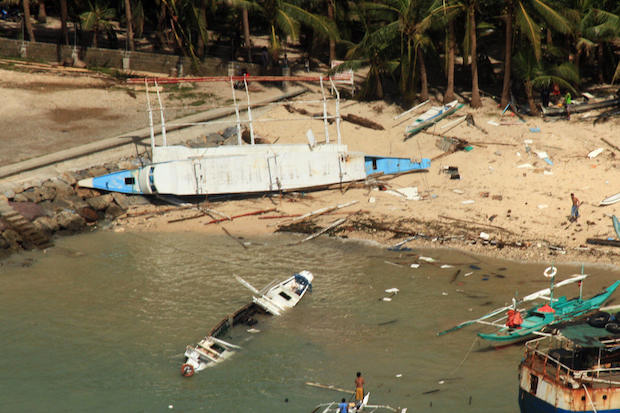Guintacan was saved by the very charm that almost destroyed it. The small island lies a few hours sail north west of Cebu, roughly in the centre of the Philippines archipelago. It is an isolated community of around 6,000 people that sustains itself through fishing and farming. Its beaches are the stuff of daydreams.
But Guintacan was just too far for military helicopters to bother with, too small, hilly and wooded for the C-130 Hercules aircraft to consider landing on. Only HMS Daring reached it, and only by chance. The Royal Navy Destroyer, tasked by the British government to help with the relief effort, passed by en route to Cebu city to load up with aid supplies. Whilst doing so she surveyed 1600 miles of coastline using her Lynx helicopter on-board.
They identified Guintacan as in need of help by the way the islanders signalled to the helicopter as it flew over: a two handed wave of desperation rather than the one hand of intrigue.
And so Daring set about going to help – bringing with her aid, medics and us, a Sky News team of two – myself and cameraman Richie Mockler. The only journalists on-board and only allowed on once everything else had rightly taken priority. We were the first outsiders to land on Guintacan Island since Typhoon Haiyan punched its way through ten days previously.
What we found was quite extraordinary. The elected village captains – known as ‘Punong Barangays’ and all of whom are women on Guintacan – had drawn up lists of the dead and the living.
The former had been sent to whichever government ministry in Manila was compiling such grim statistics; the latter was a personal record for the island, annotated to include the details of those injured or suffering from illness.
There was no such record of material loss. When every building is damaged, what would be the point?
For ten days they had suffered in isolation, becoming increasingly convinced that help would never come. How many societies have imploded in the face of such desperate prospects? Not here. Life went on simply because it had to. This society had agreed upon its priorities. Individually they resolved to rebuild their own properties, but collectively they wanted the outsiders and their superior tools to mend the building that sits at the centre of island life – the school.
If this could function again then the children could gather there out of the way whilst the adults set about clearing up. The Royal Navy set to work.
Richie and I left the group of medics and sailors fixing the school roof and treating the wounded. On the back of two motorbikes we drove around the island. The one road is more a concrete path, but largely clear of obstacles.
We reached the village of Dubbdub on the island’s eastern coast. Our guides wanted us to stop here. This was their village. The chapel on the hill would have had first sight of the approaching storm but on this occasion religion offered no protection to the devout Catholics living in its shadow down on the shoreline. The roof was barely there, the door dangled on its hinge. At least the tombs of the long dead lining the path to the beach had been respectfully spared. Some new ones will now be built alongside them.
This place of worship had taken a battering, just like every other building in sight. At the bottom of the slope, an icon of Mary holding the baby Jesus was propped up against a symbol of the country’s other religion – a fallen basketball hoop. It was as if nature had lashed out in anger, petulantly sweeping her arm across a table, scattering debris across the room.
In so many Filipino towns and villages, basketball courts had been cleared to display messages of SOS, tempting helicopters to land. This one stayed unplayable under the detritus of humanity. The hoop had fallen like a painting off a wall as nature slammed the door on her way out.
The trees that still stood, bowed in deference to a force greater than any they had weathered before. Their palms bent to the west, away from the wind, like survivors of a defeated army parading in shame, unable to raise their heads to take in the reality.
In silence we walked along beach, stepping over fallen coconuts, beached skiffs and splintered timber. In any other circumstances this would have been a little corner of paradise to be enjoyed. Not now. It is impossible to imagine the terror that must have swept through that night.
We arrived back in the main town square to witness a performance of human nature at its very best. A hundred or so had gathered, three or four deep, in a semi-circle around a plastic table from where a Punong Barangay was reading out a list of names. One-by-one they would come forward to collect their parcel: a shelter kit and a pack of high-energy biscuits. There was no frenzy, no jumping the queue. Having waited this long, they could manage a few minutes longer.
The aid workers looked on but had no further role to play. The island was managing itself.
This week parents took their children back to the school for the first time since Typhoon Haiyan terrified their young minds. Not for lessons but for counselling. It will take a long time for the memories to fade.
Help did eventually arrive on Guintacan, and not a moment too soon. It might have taken 10 days to find its way there, but self-pity never even made it.
In the end mankind had defeated nature.
Alistair Bunkall is Defence Correspondent for Sky News. Follow him on Twitter @AliBunkallSKY






Comments